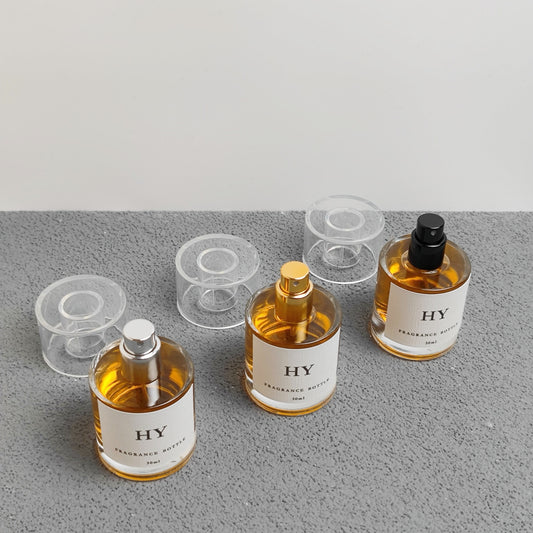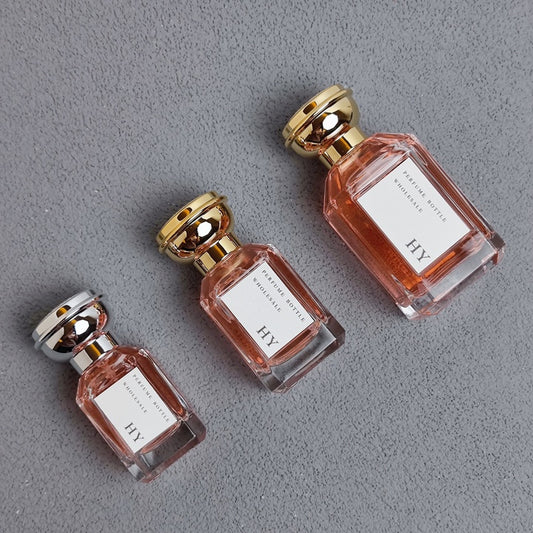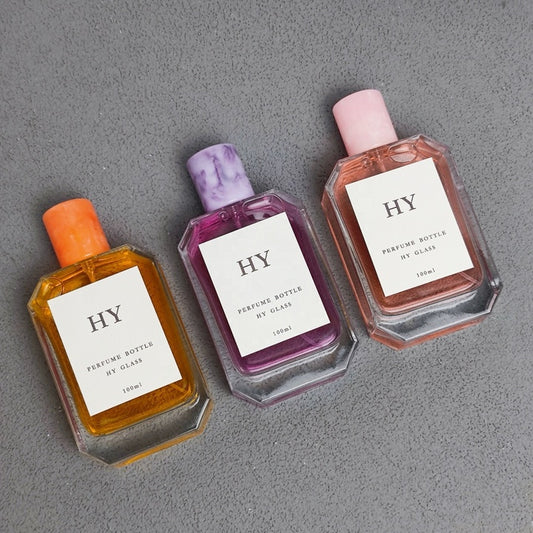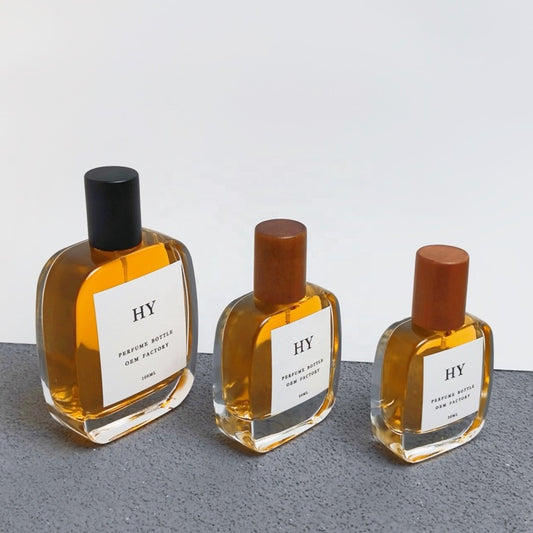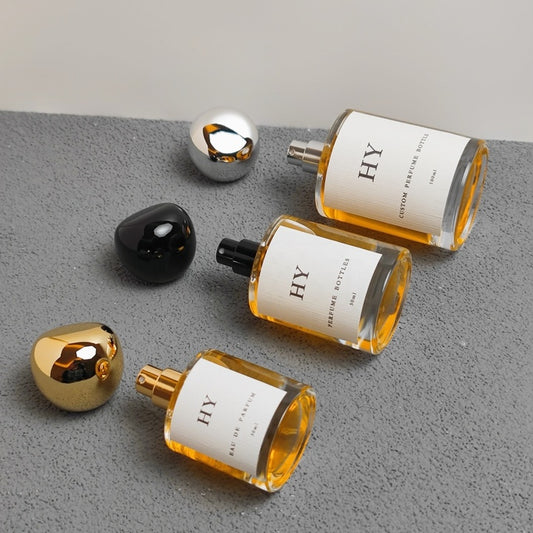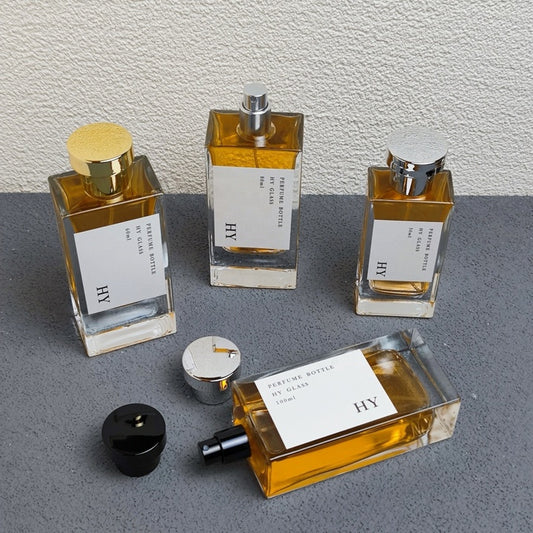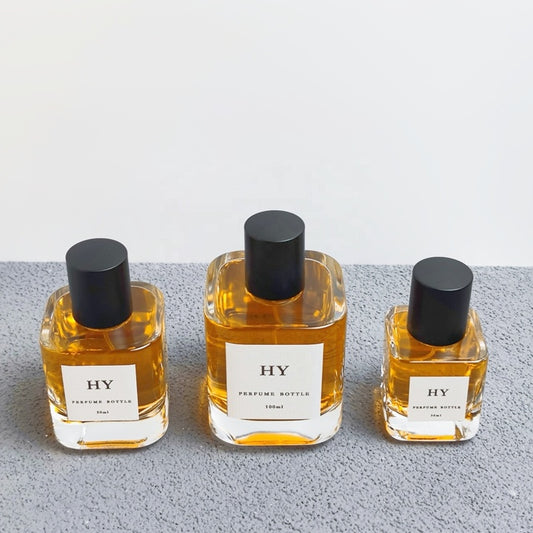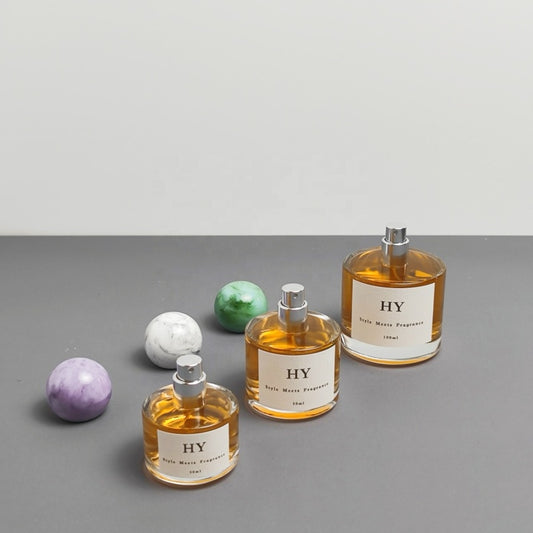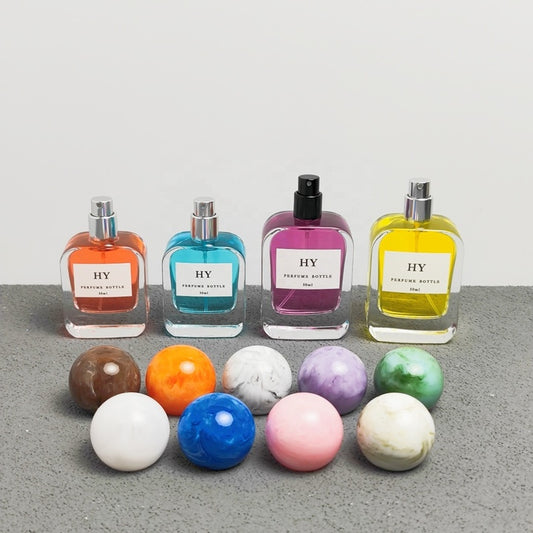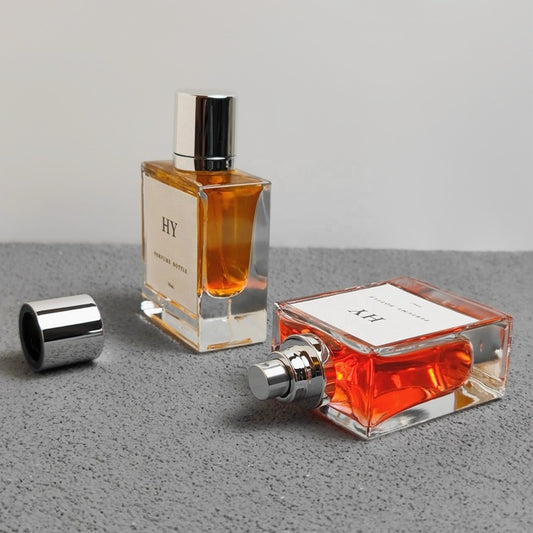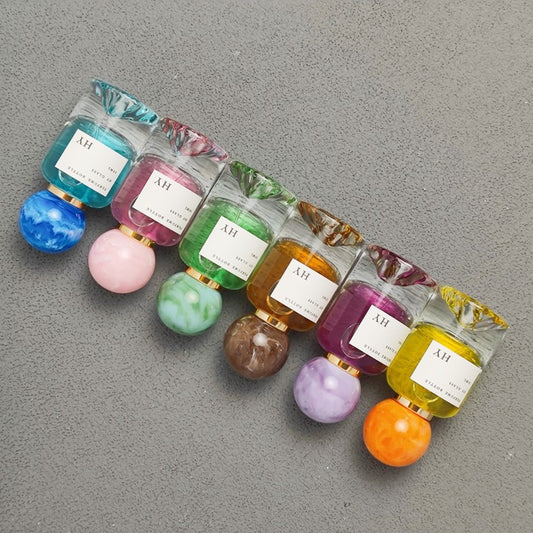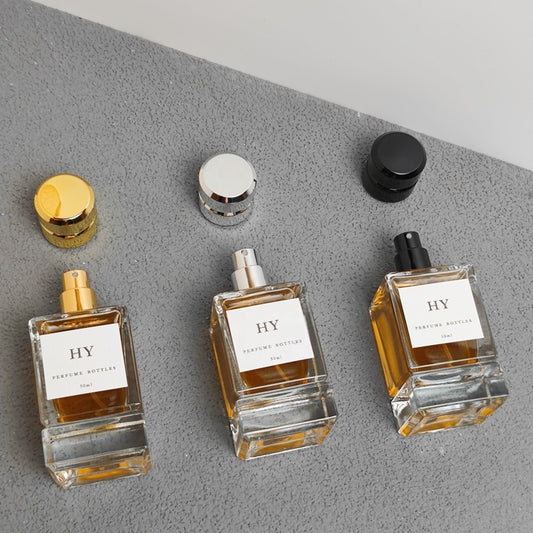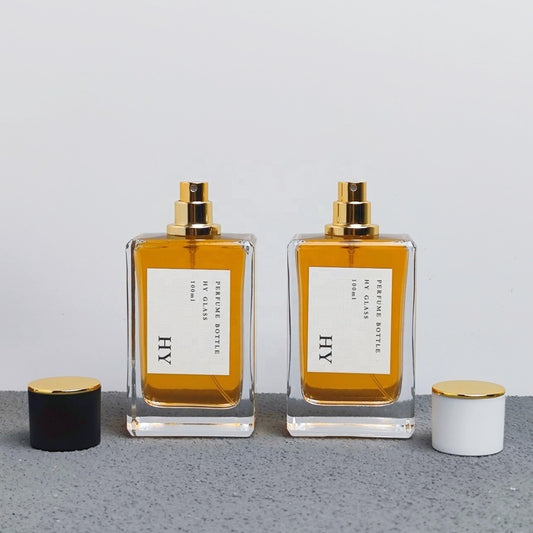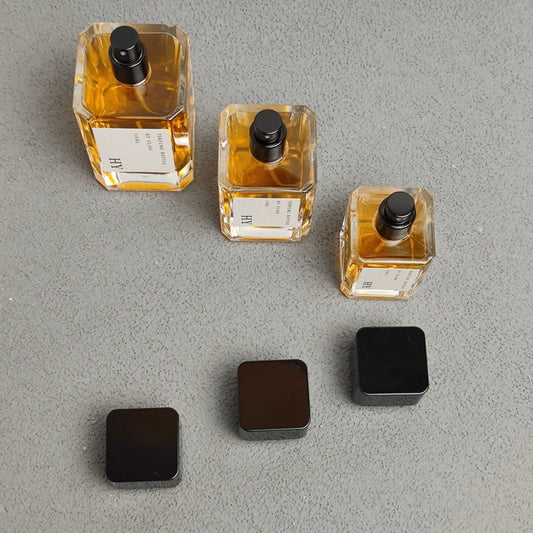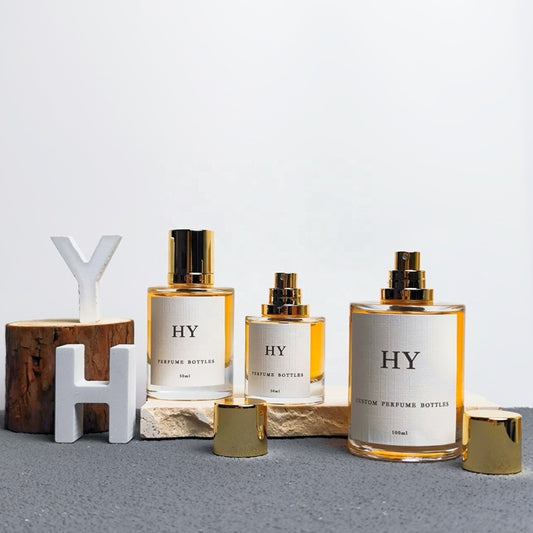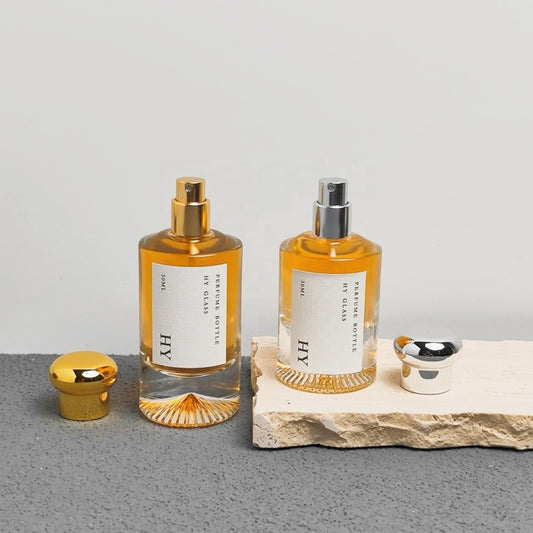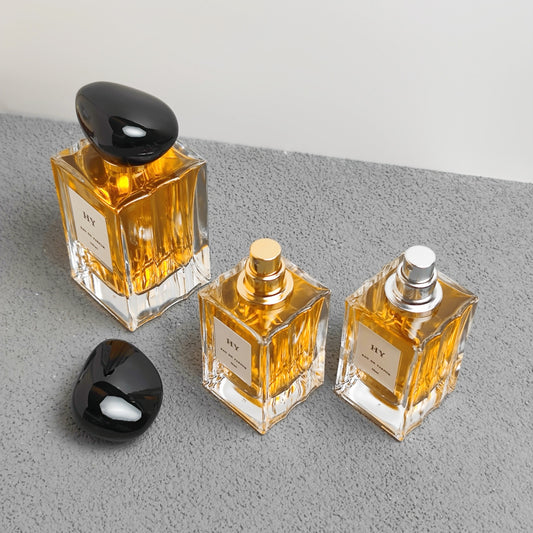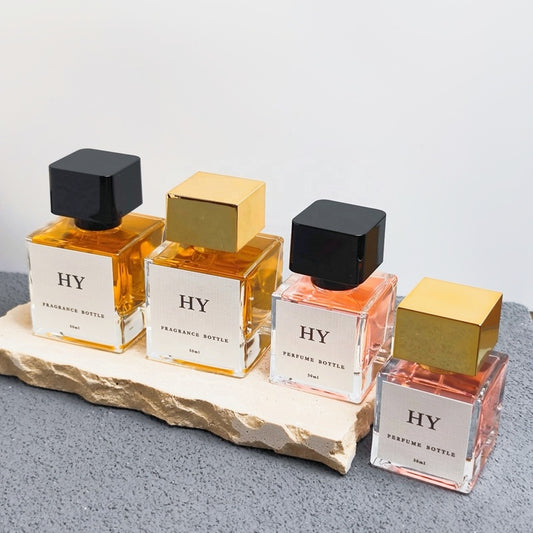
Wholesale Perfume Bottles from China
Hongyuan Glass is a custom glass perfume bottle manufacturer in China. Explore our well-designed fragrance bottles. Contact if you need further custom decoration service like hot stamping, silk screening, painting, frosting, labeling, boxing, etc.
-
Luxury 30ml Easy Crimp Empty Cylinder Clear Glass Perfume Spray Bottle with Transparent Cylindrical Cap
Regular price $0.47Regular priceUnit price / per -
High Quality 30ml 50ml 100ml Crimp Neck Amber Perfume Bottles with Wooden for Ball Caps and Pump Sprayer Wholesale
Regular price From $0.56Regular priceUnit price / per -
New Design Low MOQ 30ml 50ml 100ml Fancy Octagon Glass Perfume Bottle with Luxury Cap for Fragrance Packaging
Regular price From $0.57Regular priceUnit price / per -
Premium 100ml Flat Octagon Glass Perfume Bottle with Marble Pattern Resin Caps Stock Fragrance Spray Packaging
Regular price From $0.69Regular priceUnit price / per -
Custom Logo Minimalist Flat 30ml 50ml 100ml Glass Perfume Bottles Transparent Thick Wood Cap with Pump Sprayer
Regular price From $0.50Regular priceUnit price / per -
Minimalist 30ml 50ml 100ml Cylinder Glass Perfume Atomizer Bottle Customizable with Stone Shape Cap
Regular price From $0.59Regular priceUnit price / per -
In Stock Luxury Rectangle Perfume Bottles Thick Bottom Metallic Cap 50ml 60ml 80ml 100ml Crimp Neck Pump Sprayer Sealing Type
Regular price From $0.46Regular priceUnit price / per -
Wholesale High-End Elegant Square Thick Glass Perfume Bottles 30ml 50ml 100ml Crimp Type Matte Black Cap Pump Sprayer Sealing
Regular price From $0.47Regular priceUnit price / per -
Wholesale Minimalist Cylindrical Perfume Bottles 30ml 50ml 100ml Capacity Thick Glass with Marble Pattern for Ball Cap Pump
Regular price From $0.69Regular priceUnit price / per -
Wholesale 30ml 50ml Flat Glass Perfume Bottles Rounded Rectangle with Colorful Marble Pattern and Pump Sprayer for Ball Caps
Regular price From $0.74Regular priceUnit price / per -
Low MOQ Luxury Thick Transparent Glass 50ml Flat Square Perfume Bottle with Silver Cap for High-End Fragrance Oil Packaging
Regular price $0.65Regular priceUnit price / per -


Luxury Ribbed Cylinder Glass Perfume Spray Bottles 30ml 50ml 100ml with Gold Top Cap and Pump Sealer
Regular price From $0.55Regular priceUnit price / per -
Wholesale Artistic Marble Pattern Oval Glass Perfume Bottle 30ml 50ml 100ml Mountain Bottom Design with Pump Sprayer Ball Cap
Regular price From $0.79Regular priceUnit price / per -
Custom Logo Luxury Heavy Glass Perfume Bottle 30ml 50ml 100ml Square Shape with Gold Silver Black Cap and Pump Sprayer Low MOQ
Regular price From $0.54Regular priceUnit price / per -
Wholesale 100ml Simple Thick Rectangle Glass Perfume Bottle with Gold Top and Black/White Round Cap Pump Sprayer Sealing Type
Regular price $0.70Regular priceUnit price / per -
Wholesale Luxury Square Glass Perfume Bottles 30ml 50ml 100ml Empty with Black Square Cap & Pump Spreayer
Regular price From $0.54Regular priceUnit price / per -
Wholesale Luxury 30ml 50ml 100ml Cylinder Atomizer Glass Perfume Bottles with Gold Cap
Regular price From $0.54Regular priceUnit price / per -
Luxury Radiating Base Cylinder 30ml 50ml Heavy Clear Glass Perfume Spray Bottle with Cute Gold Silver Cap
Regular price From $0.50Regular priceUnit price / per -
Luxury 50ml/100ml Square Glass Perfume Bottle Unique Wavy Rectangle Design Oval Stone Shaped Cap Pump Sprayer Stock Luxury Item
Regular price From $0.65Regular priceUnit price / per -
Luxury Thick Glass Cube Perfume Bottles 30ml 50ml Crimp Neck with Elegant Black and Gold Square Caps and Pump Sprayer
Regular price From $0.61Regular priceUnit price / per
Who We Are

Hongyuan
SCOPE CERTIFICATE
Xuzhou Hongyuan Glass Technology Co., Ltd. has been audited and found to be in conformity with the
GLOBAL RECYCLED STANDARD (Version 4.0)

HONGYUAN
ISO9001 CERTIFICATION
Quality Management System Certification
GB/T 19001-2016/ISO 9001:2015
Production of glass bottles

Hongyuan
ISO14001 CERTIFICATION
Environmental Management System Certification
GB/T24001-2016/ISO 14001:2015
Environmental management activities related to glass bottle production
What is a perfume bottle called?
A perfume bottle is typically called a "flacon." The term "flacon" is derived from the French word for bottle. Perfume bottles come in various shapes, sizes, and designs, often reflecting the aesthetics of the perfume brand or the era in which they were produced.
Here are some other terms or names used to describe a perfume bottle:
- Flacon - A decorative or ornate bottle specifically designed for holding perfume.
- Vial - A small bottle, often used for sample sizes or for carrying small amounts of perfume.
- Atomizer - A type of perfume bottle with a spray mechanism.
- Decanter - A bottle used for pouring or transferring perfume.
- Scent bottle - A generic term for any bottle containing perfume or fragrance.
- Potion bottle - A whimsical or fantasy-inspired name for a perfume bottle.
- Eau de parfum bottle - Referring specifically to a bottle containing eau de parfum, a type of perfume concentration.
- Rollerball - A bottle with a rollerball applicator for applying perfume directly to the skin.
- Travel spray - A small, portable bottle designed for travel purposes.
- Antique bottle - A vintage or old-fashioned perfume bottle.
These terms can vary depending on the style, design, or function of the perfume bottle.
Why is perfume in a glass bottle?
Perfume is often stored in glass bottles for several important reasons:
1. Preservation: Glass is impermeable to air and light, which are two factors that can degrade the quality and fragrance of perfume over time. Keeping perfume in a glass bottle helps protect it from oxidation and UV light exposure, which can alter its scent.
2. Chemical Stability: Glass is chemically inert, meaning it doesn't react with the perfume or its ingredients. This ensures that the fragrance remains unchanged and doesn't get contaminated by the bottle material.
3. Aesthetics: Glass bottles allow consumers to see the color and clarity of the perfume, which can be part of the overall sensory experience. Additionally, glass can be molded into various shapes and designs, making it versatile for creating aesthetically pleasing and distinctive bottle designs.
4. Recyclability: Glass is highly recyclable, making it an environmentally friendly choice compared to some other materials. Many perfume brands and consumers prioritize sustainability, and glass bottles can be reused or recycled more easily than plastic or metal containers.
5. Perception of Luxury: Glass bottles are often associated with quality, luxury, and a high-end product. The weight, feel, and clarity of glass can contribute to the perceived value and premium nature of the perfume.
6. Seal Integrity: Glass bottles can provide a tight seal, helping to prevent evaporation and leakage, ensuring that the perfume remains fresh and potent.
While glass is the most common material for perfume bottles, there are also some perfume containers made from other materials like ceramic, metal, or even high-quality plastic. However, glass remains a popular choice due to its suitability for preserving the fragrance and its aesthetic appeal.
How much is in a bottle of perfume?
The amount of perfume in a bottle can vary widely depending on the size and type of bottle. Here are some common sizes and the amount of perfume they typically contain:
1. Travel or Miniature Size: Usually contains between 1 ml to 15 ml (0.03 oz to 0.5 oz) of perfume.
2. Standard Size: Common sizes for standard bottles are 30 ml (1 oz), 50 ml (1.7 oz), and 100 ml (3.4 oz).
3. Large or Economy Size: These bottles can contain 200 ml (6.8 oz) or even more.
Here's a general breakdown of how long different sizes might last with regular use:
* Travel/Miniature Size: A few weeks to a couple of months, depending on frequency of use.
* 30 ml (1 oz): 1 to 2 months
* 50 ml (1.7 oz): 2 to 3 months
* 100 ml (3.4 oz): 4 to 6 months
* 200 ml (6.8 oz) or larger: 6 months to a year or more
Keep in mind that these are just estimates and actual usage can vary based on factors like how often you use the perfume and how much you apply each time. The concentration of the perfume (eau de parfum, eau de toilette, etc.) can also affect its longevity.


